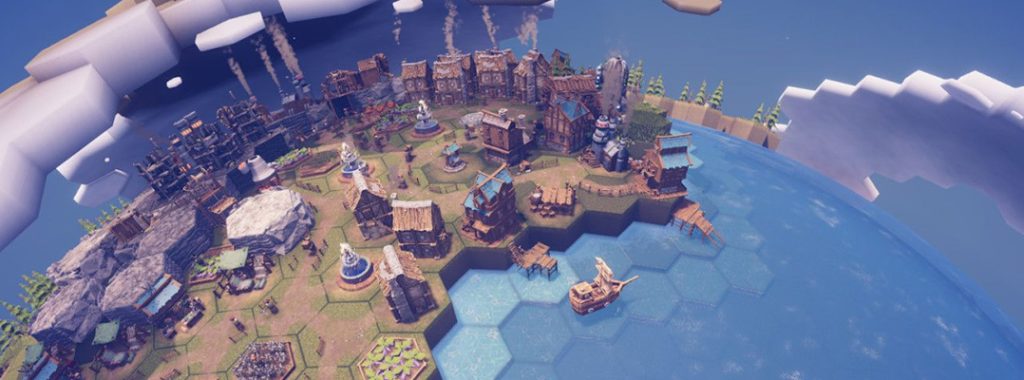It’s hard to separate The Settlers-style city-building strategy games from the colonialism embedded in them—after all, this is a whole genre built around the idea of settling unfamiliar land and creating a thriving community there. But Before We Leave, from Dunedin-based Balancing Monkey Games, looks at it through a different lens: rather than sending an expedition to claim contested or “uncharted” land, it’s all about reclaiming what was taken from you.
Each game starts with a small group of “Peeps” emerging from an underground bunker. A series of disasters forced the people underground many generations ago, and now that the dust has finally settled on the surface, they’re ready to return and reclaim their land, albeit with limited knowledge of what life above ground is like. Their agricultural expertise is limited to growing potatoes, and almost all of their ancestors’ technological understanding is lost.

With this, Before We Leave sets itself up for those things that drive the settler school of city-builders: the sense of discovery as you explore unfamiliar land, and unique strategic challenges of growing a new settlement into a thriving civilisation. But where most other such games take a colonialist approach—whether explicitly or implicitly, whether through conflict with other civilisations or trying to tame the natural order of an alien land—Before We Leave takes those same mechanics and reframes them as a process of decolonisation. It’s about taking back your own land, not trying to carve out a piece of someone else’s.
Here, researching new technological advances comes through digging up your Peeps’ own ancestral knowledge from the ruins of what was left behind when they were forced underground. Rather than exploiting finite natural resources, the stone and iron that’s crucial for rebuilding your civilisation is mined from the remnants of pre-apocalypse cities and ancient machinery. The function is the same as in any other civilisation-building game, but framed as your people reconnecting with their history and their land. It’s refreshing.
This sentiment extends even to “colonising” other planets, which is one of the more unique aspects of Before We Leave‘s design. Each planet is, on its own, relatively small and can be fully explored in a couple of hours, but the discovery of an old rocket—there’s always one somewhere on your first planet—opens the door to space travel research, allowing you to expand your civilization to neighbouring planets, with the strategic and resource flow challenges that come with that. But rather than the “alien” planets you expect, these new worlds, too, were once home to your Peeps’ ancestors and part of their journey to rediscover their heritage (though the question of how those ancestors came to live across multiple planets in the first place isn’t really addressed, from what I’ve been able to find).

It’s from this same school of thought that Before We Leave takes a non-violent approach to a genre that often uses conflict as at least part of its core loop. There are no rival civilizations to go to war with, deadly creatures posing a threat to new settlements, or even wildlife to hunt. Even the elements are a hindrance more than anything else—bad weather may slow down crop growth and make Peeps unhappy, but you don’t have to worry about a tornado coming and ravaging a village. The biggest threat you’ll face are the dreaded Space Whales that can swallow a planet whole—but even then, they’re something to be avoided or negotiated with, not fought.
Instead of conflict, challenge comes from how you manage increasingly complex resource chains, keeping your citizens happy, and most of all, maintaining an environmental balance. Before We Leave isn’t a game where you’ll have much success by trying to offset a resource-intensive, high-pollution industry by planting a few trees; it’s one where environmental impacts need to be a key consideration in everything you do.
In short, it works like this: many of your key structures will pollute neighbouring tiles over time, with that pollution dampening the spirits of your population, making them work slower (and even quit, if things get bad enough). Letting pollution get too bad will slow your growing civilisation to a crawl, but you can manage it—to an extent. Trees will gradually clean pollution on their own tile, and a pollution cleaner, once researched and built, can slowly clean pollution within a zone of a few tiles.

The catch is that pollution is cumulative, and there are no quick fixes for cleaning. Stack too many high-waste buildings in close proximity, and no amount of trees or cleaners will be able to tidy things up. Instead, Before We Leave encourages you to keep this balance in mind from the outset, preventing pollution from accumulating in the first place by factoring space for anti-pollutants in any time you’re building a new structure and making the most of naturally-occurring trees (to save on the hefty resource cost of planting new ones, as much as possible).
This environmental aspect combines with the way Before We Leave generates its islands and planets to create an interesting strategic element to town planning. Islands are relatively small in the scheme of things, and typically have a large number of trees taking up valuable land space. Big open spaces that you can freely build to your own interests are rare, and while you can chop down trees when needed, it’s in your best interests to avoid doing so as much as possible, instead working with and around the existing natural woodlands. In this way, the game turns every new speight of city growth into a little puzzle of sorts, and adds weight to every decision about where and how to build.
In other words, Before We Leave isn’t dramatically different from the games that inspired it, but the environmental focus and anti-colonialist framing give it a unique, refreshing spin. That’s coupled with a cute art style—not aggressively twee, but warm and wholesome, to fit the overall relaxed nature of the game. That’s not to say it’s without challenge if you want it—micromanaging all the different moving pieces of a growing civilisation can be a complex and demanding task, especially on higher difficulties, but it comes without too much pressure.

Scenarios also add some nice twists for people wanting more of a challenge, with each one employing some unique rules and win/lose conditions. One starts you with all technology researched and a huge amount of resources, but a strict time limit to move from one planet to the next as a Space Whale bears down on you. Another sees you trying to deal with population numbers spiralling out of control, as new Peeps constantly appear and need to be accommodated. One particularly entertaining one, “The Hut-Owners Association”, puts strict limits on where you can build houses, and what other structures can occupy adjacent tiles. There are just four scenarios at launch, but they’re each a nice twist on the core of Before We Leave.
A bit more variety across the game wouldn’t go amiss, though. Despite procedural generation, most planets are broadly similar, and tend to push you towards particular strategies with little scope to get too experimental in how you approach different obstacles. A few different climates—tropical, desert, and snowy tundra—each come with their own quirks, but not much that has a massive impact on how you play. Buildings, beautiful though they are individually, lack visual distinction when you’re looking across a densely-populated planet, and there’s little in the way of cosmetic things you can do to really customise the look and feel of your towns and cities.

But those are minor complaints, really. Before We Leave is an intriguing, enjoyable game—one that puts its own twist on a Settlers-style civilisation-building game with a heavy environmental focus and a reframing of the colonialist implications that tend to underpin the genre. It’s a relaxed, chilled-out city-building experience, but within the premise of reclaiming your own land instead of colonising someone else’s, it’s also a thought-provoking one.
Reviewed on PC. Originally published on Shindig.

